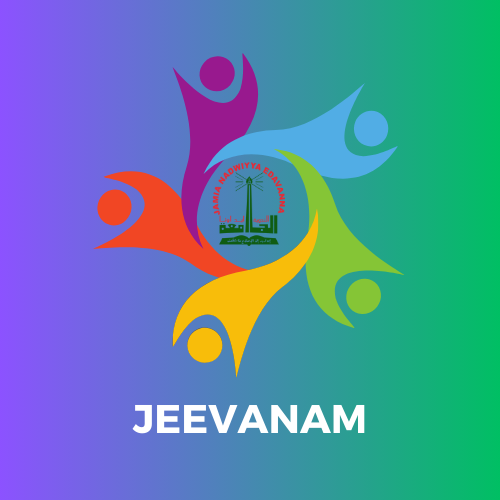"Jeevanam"

JEEVANAM: VILLAGE ADOPTION
The title of the project "Jeevanam" signifies a humane effort by the institution to support the comprehensive development dynamics of the adopted villages of Edavanna and Chembakkuthu. The word 'Jeevanam' in Malayalam means to give life.
Objectives of the Practice:
➢ Contribute to the socio-economic development of the edavanna and chembakkuthu localities.
➢ Provide educational and economic support to the communities in edavanna and
chembakkuthu.
➢ Expand knowledge in line with scientific and technological advancements.
➢ Raise awareness about the importance of health preservation among local residents.
➢ Educate the community about life style diseases and their prevention and management.
➢ Teach the necessary skills and knowledge for waste mangement.
Context
In the wake of the 2019 flood, students and teachers from the institution volunteered in various disaster management activities, such as cleaning flood-affected schools and houses, and distributing food kits to victims in the edavanna area. This experience heightened the students' awareness of social responsibility. The volunteer work during the 2019 flood prepared students to take on similar roles during the COVID-19 pandemic. Many residents of Edavanna and Chembakkuth , who had been working abroad for years, lost their jobs due to the pandemic and had to return home. Recognizing the need to help, the academic community decided to extend support to the local community. To instill a sense of social responsibility in students, the institution conducted a survey to assess the development indicators of the edavanna and chembakkuthu villages This led to the launch of "Jeevanam," a comprehensive community initiative program aimed at encouraging students to contribute to the overall growth of both villages on social, economic and emotional levels.
Efforts from various departments and committees within the institution are coordinated to create a positive impact in the villages. The range of activities under the "Jeevanam" community extension project includes rehabilitating affected individuals, distributing food kits during festivals such as Onam and Eid, fostering scientific temper among school students and providing financial support to those in need. Street plays and cultural activities were organized to raise social awareness and entertain the villagers. Attentive to the needs of the community, students actively volunteer to raise funds for distributing food kits and other essentials.
Kai thangu: Educational support program
Educational support initiatives included providing books and other learning materials to students in need.NSS volunteers organized a stress management training program for selected students, who then preparing for scholarship exams. Additionally, games and cultural programs were held for children. NSS volunteers also collected books for libraries in the village Anganvadi.
Sucheevanam:Health care
Health Care awareness programmes on life style diseases are conducted on regular basis. On holidays and weekends in particular, the trained volunteers assist, associate and accompany the members of edavanna Palliative clinic while visiting the homes of patients. Volunteers also collected fund for the clinic.
Edavanna, a village situated on the banks of the Chaliyar River, has been severely affected by floods. Due to the vulnerability of Edavanna and nearby villages to natural disasters, the institution volunteers for rehabilitation activities such as cleaning flood-affected houses and shops, reinstating libraries, and distributing relief kits.
Science Expos
Science Expo and students Lab launched to inculcate scientific temperament among the students of the Government schools in the locality. During the COVID-19 pandemic, the college provided accommodation for patients returning from abroad and other states. The college hostel was converted into a facility to host these patients, ensuring they received the necessary care and support.
Evidence of Success
The project has significantly impacted the lives of the village residents. At the start of the ‘Jeevanam’ initiative, many students lacked smartphones to attend online classes, so they were provided with these devices. Additionally, learning materials such as notebooks, pens, pencils, and school bags were distributed to needy students in the area.
As a result of the stress management skill development program, students could improve a better mental temperament and able to face exams confidently. The smartphones donated by NSS volunteers and department of English students enabled recipients to attend online classes provided by the education department during the COVID-19 pandemic. Science exhibitions and training organized by physics department helped to develop the scientific temperament of budding students in the locality. Through these activities, students realized the objectives of the project.
Problems Encountered and Resources Required
Despite the institution's excellent facilities and serene environment, its remote location from populated residential areas limits student access to service points and hinders their timely involvement in neighborhood social services, particularly during holidays. This constraint affects the number of interaction events that can be convened during vacations, impacting the effectiveness of physical, mental, emotional, and social upliftment sessions for the target community. Seasonal climatic variations, such as unexpected rain, floods, and droughts, also hinder the quality of practical lessons in communal living that volunteers learn from real- life situations. Due to insufficient transport facilities, scheduling events before or after college hours results in reduced participation, as most students rely on transportation provided by the institution.


























